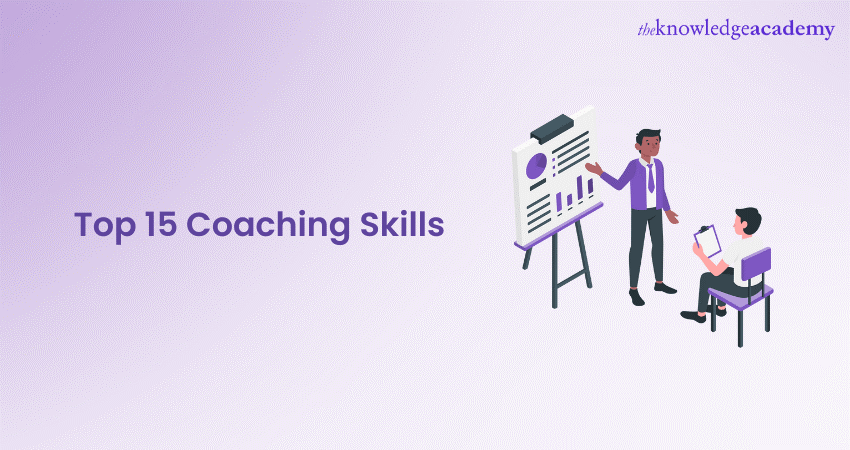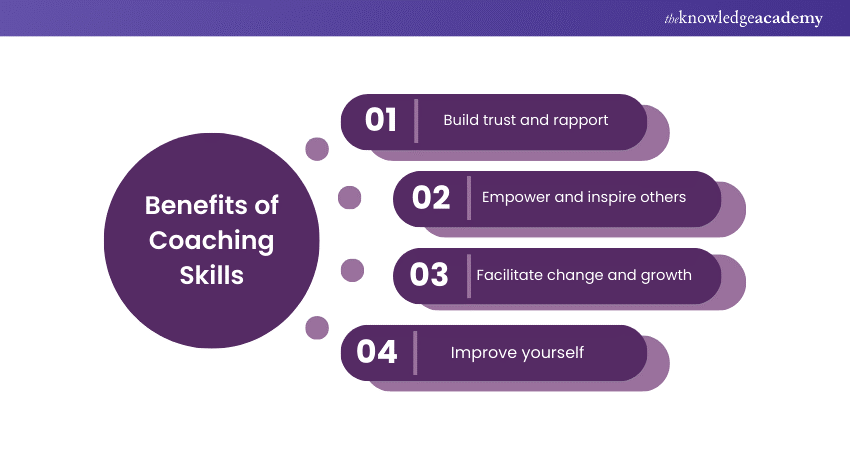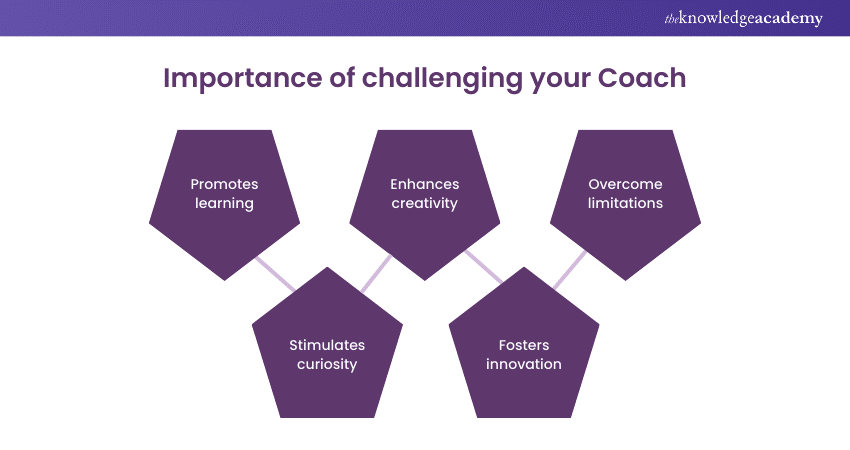We may not have the course you’re looking for. If you enquire or give us a call on 01344203999 and speak to our training experts, we may still be able to help with your training requirements.
We ensure quality, budget-alignment, and timely delivery by our expert instructors.

Coaching is a process of helping others achieve their goals, overcome challenges, and unlock their potential. However, this task cannot be properly fulfilled without the necessary Coaching Skills. These are the abilities and techniques that enable you to do this effectively.
From a professional coach, a leader, a teacher, or a friend, these skills can help you empower others and foster positive relationships. Incorporating life coaching techniques, it’s time to learn about these skills and position yourself as a confident coach. In this blog, you will learn what Coaching Skills are, why they are important, and the 15 best Skills in Coaching that you need to know.
Table of Contents
1) What are Coaching Skills?
2) Benefits of Coaching Skills
3) 15 best Coaching Skills
4) How to improve Coaching Skills?
5) Conclusion
What are Coaching Skills?
Coaching Skills are the combination of knowledge, capabilities, and attitudes that enable you to facilitate the learning and development of others. The benefits of online coaching further enhance these skills by offering versatile and accessible methods for supporting and guiding individuals, making it easier to tailor coaching strategies to diverse needs and situations. These Skills include the following:
a) Active listening
b) Questioning
c) Giving feedback
d) Building rapport
e) Setting goals
f) Motivating
g) Challenging and supporting, and more
Coaching Skills are useful not only for professional Coaches but also for anyone who wants to help others grow and succeed. Possessing these Skills, often emphasized by a personal development coach, can help you improve your communication, leadership, problem-solving, and Emotional Intelligence.
Benefits of Coaching Skills
Possessing Coaching Skills is important for many reasons. Here are some of the Benefits of Coaching Skills:

1) Build trust and rapport: Coaching Skills can help you build trust and rapport with others. By listening actively, showing empathy, and being respectful, you can create a safe and helpful environment for Coaching. This can enhance the quality of your relationships and increase your influence.
2) Empower and inspire others: Coaching Skills can help you empower and inspire others. By asking powerful questions, giving constructive feedback, and encouraging self-discovery, you can help others find their own solutions. Moreover, you can assist them to develop their skills and achieve their goals. This, in turn, can boost their confidence, motivation, and performance.
3) Facilitate change and growth: Coaching Skills can help you facilitate change and growth. By setting goals, providing accountability, and challenging assumptions, you can help others overcome obstacles, embrace new perspectives, and take action. This can foster their learning, development, and innovation.
4) Improve yourself: These Skills can help you in self-improvement. By practising self-awareness, self-regulation, and self-reflection, you can enhance your own Coaching Skills and effectiveness. You can also learn from your Coaches, gain new insights, and expand your horizons.
Disseminate knowledge and sharpen your active listening skills by signing up for our Train the Trainer Course now!
15 best Coaching Skills
Now, let’s explore what are the good Coaching Skills a Coach needs to master. Here are the 15 best Coaching Skills that you need to learn and master:
1) Active Listening
Active Listening means paying full attention to what the other person is saying, both verbally and non-verbally. Active Listening involves using eye contact, body language, paraphrasing, summarising, and clarifying to show interest, understanding, and respect. This skill is essential for Coaching because it helps you build rapport, establish trust, and identify the needs, goals, and challenges of your Coachee(s).
2) Powerful questioning
Powerful questioning is the skill of asking open-ended, probing, and relevant questions that elicit deeper thinking, awareness, and action from your Coachee(s). Powerful questions are usually short, simple, and focused on the Coachee(s)’ perspective, feelings, and desires. Powerful questioning is vital for Coaching because it helps you explore the Coachee(s)’ situation, uncover their potential, and stimulate their creativity and learning.
3) Constructive feedback
Constructive feedback is one of the fundamental Coaching Skills. It includes giving honest, specific, and timely information that helps your Coachee improve their performance, behaviour, or attitude.
Constructive feedback is based on facts, observations, and examples, and it includes both positive and negative aspects. Constructive feedback is crucial for Coaching because it helps you acknowledge the Coachee’s strengths, highlight their areas of improvement, and suggest ways to improve their results.
4) Rapport building
Rapport building is the skill of creating a positive and harmonious relationship with your Coachee based on mutual respect and understanding. Rapport building involves using non-verbal and Verbal Communication techniques, such as mirroring, matching, and pacing, to establish rapport and rapport.
Rapport building is important for Coaching because it helps you create a comfortable and supportive atmosphere. It also increases your Coachee’s trust, openness, and cooperation.
5) Goal setting
Goal setting is the skill of helping your Coachee define and achieve their desired outcomes. Goal setting involves using the SMART framework (Specific, Measurable, Achievable, Relevant, and Time-bound) to set clear, realistic, and meaningful goals that align with the Coachee’s vision, values, and purpose.
Goal setting is key for Coaching because it helps you clarify the Coachee’s direction, focus, and motivation. Moreover, it provides a framework for examining and evaluating their progress and success.
6) Motivating
Motivating means inspiring and energising your Coachee to pursue their goals and overcome their challenges. Motivating involves using various strategies, such as praising, rewarding, recognising, and celebrating, to acknowledge the Coachee’s efforts, achievements, and potential. Motivating your Coachee(s) is crucial to boost their confidence, enthusiasm, and resilience and help them overcome setbacks, obstacles, and fears.
7) Challenging your Coachee(s)
It means pushing your Coachee(s) out of their comfort zone and helping them grow and learn. Challenging involves using various techniques, such as asking tough questions, giving honest feedback, and confronting limiting beliefs to challenge the Coachee’s assumptions, perspectives, and behaviours.

Challenging is important for Coaching because it helps you stimulate the Coachee’s curiosity, creativity, and innovation, and it helps them discover new possibilities, solutions, and opportunities.
8) Supporting
Supporting involves providing your Coachee with the necessary resources, guidance, and encouragement to achieve their goals and overcome their challenges. Supporting involves using various methods, such as listening, empathising, advising, and mentoring, to show your Coachee that you care, understand, and value them. Supporting your Coachee(s) is vital for Coaching because it helps you create a reliable environment for Coaching, and your Coachee feels more confident, capable, and empowered.
Get familiarised with effective coaching by signing up for our Coaching Skills Course now!
9) Empathy
Empathy means understanding and sharing the feelings, thoughts, and experiences of your Coachee. Empathy involves using your emotional intelligence, intuition, and imagination to put yourself in the Coachee’s shoes and see the world from their perspective.
This Coaching Skill is essential because it helps you build rapport and trust with your Coachee. Moreover, it helps you tailor your Coaching approach to their needs, preferences, and style.
10) Communication
Communication is the skill of expressing and exchanging information, ideas, and opinions with your Coachee effectively and efficiently. Communication involves using verbal and non-verbal Communication Skills, such as speaking, writing, listening, and body language, to convey your message clearly, concisely, and confidently. Communication is crucial for Coaching because it helps you establish a common understanding, avoid misunderstandings, and resolve conflicts with your Coachee(s).
11) Problem-solving
Problem-solving means helping your Coachee(s) identify, analyse, and resolve their problems and challenges. Problem-solving involves using logical, analytical, and creative thinking skills, such as brainstorming, decision-making, and action planning, to generate and evaluate possible solutions and implement the best one. Problem-solving is important for Coaching because it helps you help your Coachee overcome obstacles, improve their performance, and achieve their goals.
12) Emotional intelligence
Emotional intelligence is the skill of recognising, understanding, and managing your own and your Coachee’s emotions. Emotional intelligence involves using four components, self-awareness, self-regulation, social awareness, and social skills, to enhance your emotional and social competence.
Emotional intelligence is vital for Coaching because it helps you develop rapport, empathy, and trust with your Coachee(s). Moroever, it helps you adapt your Coaching style to their emotional state and needs.
13) Self-awareness
Self-awareness is the skill of being aware of your own strengths, weaknesses, values, beliefs, and biases. Self-awareness involves using various tools, such as feedback, reflection, and assessment, to monitor and evaluate your own Coaching Skills and effectiveness. It is an essential Coaching Skill because it helps you improve your own Coaching practice, identify your areas of improvement, and leverage your strengths.
14) Self-regulation
Self-regulation is the skill of controlling and managing your own emotions, impulses, and behaviours. Self-regulation involves using various techniques, such as breathing, relaxation, and mindfulness, to calm yourself down, cope with stress, and stay focused. Self-regulation is crucial for Coaching because it helps you maintain your professionalism, credibility, and rapport with your Coachee, and it helps you handle difficult situations and emotions.
15) Creativity
Creativity means generating unique and useful ideas, solutions, and approaches. Creativity involves using divergent and convergent thinking skills, such as brainstorming and mind mapping to explore and evaluate various possibilities and alternatives. Creativity is important for Coaching because it helps you help your Coachee overcome mental blocks, break out of habitual patterns, and discover new opportunities and potential.
Ready to level up your skills and unlock your full potential? Enroll now in our Mentoring Training Course and embark on a transformative learning journey!
How to improve Coaching Skills?
Now that you have learned what Coaching Skills are and their importance, you might wonder how to improve them, especially if you aspire to Become a Life Skills Coach. Here are some tips on how to improve your Coaching Skills and become a more effective Coach:

1) Practice: The best way to improve your Coaching Skills is to practice them consistently. You can practice these Skills by Coaching yourself, your friends, your colleagues, or your clients. You can also join a Coaching community, a Coaching course, or a Coaching certification training to practice your Coaching Skills with other Coaches and receive feedback and guidance.
2) Learn: Another way to improve your Coaching Skills is to learn from various sources and resources. You can learn from books, articles, podcasts, videos, and blogs that cover Coaching Techniques and topics. You can also learn from experts, mentors, and role models who have more experience and knowledge in Coaching. You can also learn from your own Coachees by listening to their feedback, stories, and insights.
3) Reflect: A third way to improve your Coaching Skills is to reflect on your own Coaching practice and outcomes. You can reflect on your own Coaching Skills and effectiveness by using tools such as journals, feedback forms, and supervision sessions. You can also reflect on your own Coaching goals, values, and beliefs by using tools such as assessments, surveys, and quizzes. You can also reflect on your own Coaching challenges, mistakes, and successes by using tools such as case studies, scenarios, and simulations.
Discover the difference between coaching and mentoring to choose the best path for your development.
Conclusion
We hope you enjoyed this blog and found it useful. In this blog, you explored what Coaching Skills are, why they are important, and discovered the 15 best Coaching Skills you need to learn. Additionally, you gained practical tips on how to enhance your Coaching Skills and become a more effective Coach. By mastering these essential skills and leveraging resources like Coaching Models PDF, you can elevate your coaching abilities, effectively guiding individuals and teams toward success.
Ready to enhance your leadership skills? Enroll in our Coaching and Mentoring Training Course today!
Frequently Asked Questions
What is the importance of Coaching Skills?

Coaching Skills are essential as they foster personal and professional growth, enhance performance, and promote effective leadership.
What are some key Coaching Skills that every Coach should possess?

Key Coaching Skills include Active listening, powerful questioning, empathy, goal setting, feedback delivery, problem-solving, and building rapport. Coaches should also excel in communication, emotional intelligence, adaptability, and the ability to provide constructive support.
What are the other resources and offers provided by The Knowledge Academy?

The Knowledge Academy takes global learning to new heights, offering over 3,000 online courses across 490+ locations in 190+ countries. This expansive reach ensures accessibility and convenience for learners worldwide.
Alongside our diverse Online Course Catalogue, encompassing 19 major categories, we go the extra mile by providing a plethora of free educational Online Resources like News updates, Blogs, videos, webinars, and interview questions. Tailoring learning experiences further, professionals can maximise value with customisable Course Bundles of TKA.
What is Knowledge Pass, and how does it work?

The Knowledge Academy’s Knowledge Pass, a prepaid voucher, adds another layer of flexibility, allowing course bookings over a 12-month period. Join us on a journey where education knows no bounds.
What are the related courses and blogs provided by The Knowledge Academy?

The Knowledge Academy offers various Train the Trainer Courses, including Coaching Training, Mentoring Training, and many more. These courses cater to different skill levels, providing comprehensive insights into Team Coaching benefits.
Our Business Skills blogs cover a range of topics related to Coaching, offering valuable resources, best practices, and industry insights. Whether you are a beginner or looking to advance your Business Skills, The Knowledge Academy's diverse courses and informative blogs have you covered.
Upcoming Business Skills Resources Batches & Dates
Date
 Coaching and Mentoring Training Course
Coaching and Mentoring Training Course
Fri 13th Jun 2025
Fri 22nd Aug 2025
Fri 24th Oct 2025
Fri 12th Dec 2025






 Top Rated Course
Top Rated Course



 If you wish to make any changes to your course, please
If you wish to make any changes to your course, please


